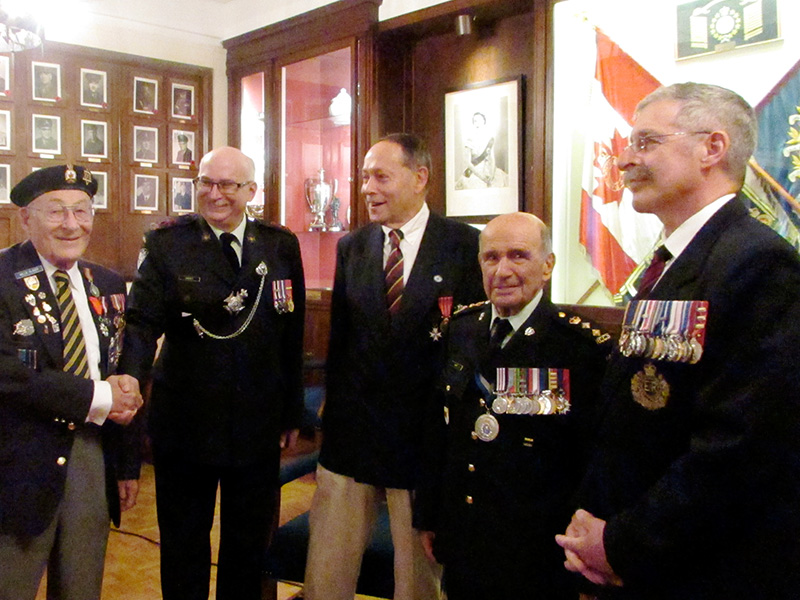Seventy-five years later, David Hart clearly remembers the slaughter that took place on the beaches of Dieppe, France, on Aug. 19, 1942. More than 900 Canadian soldiers were killed and thousands more were wounded in the raid.
Honorary Col. Hart, 99, recalled that disastrous day at an event organized by the Canadian Jewish Experience (CJE), a project celebrating Jewish contributions to Canada over its 150-year history, held at the Royal Montreal Regiment armoury in Westmount, Que., on May 29.
Hart, an army sergeant, controlled the only communication link between the front line and army headquarters.
“I couldn’t believe the order had been given to attack,” said Hart. “I saw so many killed, and yet, they were still sending people to certain death.”
In the midst of the chaos, Hart pleaded with HQ to be permitted to radio two units that were under heavy fire, to tell them that rescue craft would be arriving one hour earlier than planned. His superiors initially refused, but relented on the condition that he do it in less than two minutes.
Hart relayed the retreat order in 30 seconds through terrible static and deafening noise.
Hart was told that his action saved at least 100 lives. He was later awarded the Military Medal for bravery from King George VI at Buckingham Palace and was commended for “coolness under fire in the continuous performance of duties.”
READ: WONDER WOMAN IS ‘PERFECT ZIONIST CONSPIRACY BAIT’
In the officers’ mess where Hart spoke hangs a painting by Montreal artist Adam Sherriff Scott, depicting the battle scene that includes Hart with a receiver in his hand.
Hart, who became a chartered accountant after the war, stayed in the military, rising to the rank of lieutenant-colonel, before being honourably discharged in 1965.
In 1976, he was made an honorary lieutenant-colonel, promoted in 2013 to full honorary colonel, of the 34 Signal Regiment, based at the armoury. At almost 100, he continues a military service that began in 1931 as a cadet.
Hart, who was in uniform with a row of medals across his chest, was joined by Jewish veterans of the Canadian armed forces of a younger generation: retired Maj.-Gen. Edward Fitch, who was only the second Canadian Jew to attain that rank and who served in multiple tours with NATO and United Nations forces during his 43-year career; and retired Lt.-Col. Dr. Markus Martin, who commanded the 51st Medical Company in the reserves and was deployed to Cyprus and Afghanistan.
The discussion was moderated by Honorary Lt.-Col Richard Garber, who served in the reserves for 32 years, including commanding the Brockville Rifles regiment.
“War and Peace” is one of nine themes of the CJE, an exhibition currently on display at the Canadian War Museum in Ottawa. A mobile version was on display at the armoury for the occasion.
CJE aims to raise awareness of the Jews who fought in all of Canada’s wars and continue to serve today.
The diminutive Hart observed facetiously that he was almost rejected because he was a half-inch below the minimum height requirement.
He made so much “noise” at the recruiting office on Sept. 7, 1939, that he was eventually allowed in.
READ: BAYCREST RESIDENT ONE OF FEW LIVING WWII FIELD DOCTORS
The discussion focused on issues specific to being Jewish in the Canadian forces, including whether the panelists had experienced anti-Semitism.
The answer, in short, was no.
Fitch, an observant Jew who wears a kippah, said that his Jewish identity was strengthened during his years in the military.
“I was brought up in a very Jewish environment in Montreal, but not a religious one. I left that world overnight at 17, when I went to the Royal Military College at St. Jean, where I was the only Jew,” he said.
“A small truth came to me: if I am not prepared to respect my own religion, how can I expect anyone else to? That started my personal journey to Judaism, to my Jewish heritage, and I kept true to it as my knowledge grew, and it still goes on.”
Martin said his first exercise at Camp Wainwright in Alberta – a tough, dirty experience – only confirmed for him how great this country and its forces are. “Everybody worked cohesively as a team,” despite their diverse backgrounds, he said.
Martin’s only regret is that he didn’t sign up earlier and been able to serve for more than 21 years.
Hart said he never had a problem: “I was one of the guys who volunteered, the same as they did. I was looked upon as an ordinary soldier.”
Fitch added that, early on in their training, soldiers are instructed not to discuss religion.
“Units work hard to establish and maintain cohesion; that is the secret of winning battles.… The army is more concerned with what you can do, than where you worship.… It’s one of the purest meritocracies in Canada,” said Fitch, who now lives in Victoria.
Fitch estimates there are “several hundred” Jews in the Canadian forces today, but only the chaplain-general has that personal information. In 2010, Rabbi Lazer Danzinger became the first full-time regular forces Jewish chaplain since the Second World War.
The last word went to Hart, who recalled that when he enlisted, he insisted his dog tags show his religion. “They said the Germans will kill you if you’re caught. I said, let them know a Jew is coming after them.”
